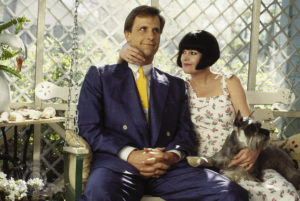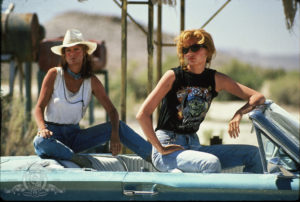Matt Zoller Seitz, the critic who is one half of the team (along with Alan Sepinwall) behind The Sopranos Sessions, an episode-by-episode analysis of David Chase’s seminal show, recently curated The Sopranos Film Festival at the IFC Center in New York, highlighting “the series’ influences and legacy on the occasion of its 20th anniversary.” Influenced by such inspired programming, I thought it’d be fun to curate a hypothetical film festival for my new novel, A Friend Is a Gift You Give Yourself. I’ve picked favorite road trip narratives, great New York City stories, screwball noirs that take place in an off-kilter yet plausible world, explorations of friendship and violence, and films that aren’t afraid to blend reality with myth and legend. I’ve split the films into four themed categories: “Live Dogs and Dead Lions,” “A History of Violence,” “Full of Life,” and “Fear and Desire.”

Live Dogs and Dead Lions:
Ball of Fire (Howard Hawks, 1941)
The Lady Eve (Preston Sturges, 1941)
Ruthless People (Jim Abrahams, David Zucker, Jerry Zucker, 1986)
Something Wild and Married to the Mob (Jonathan Demme, 1986 and 1988)
Quick Change (Howard Franklin & Bill Murray, 1990)
My book is a screwball noir. The programming for this part of the festival would be dedicated to some of my favorite works that fit that bill. My earliest desire was to write something tonally similar to my two favorite Jonathan Demme films, Something Wild and Married to the Mob. I love the leaps that both make from light to dark, the big shifts from broad comedy to shocking violence, the comedic set pieces that pave the way for meaningful action.
Going back to earlier, classic films, what’s more perfect than Howard Hawks’s Ball of Fire? And, of course, Preston Sturges’s The Lady Eve. Barbara Stanwyck gives genius performances in both, and I was really aiming to write a part like Sugarpuss O’Shea or Jean Harrington with the creation of Wolfie, the ex-pornstar grifter who also happens to make for a soft-hearted pal.
Ruthless People and Quick Change were childhood favorites that truly shaped my sense of humor and made me see how comedy and crime could work so well together. And they—like the Demme movies—are indicative of a certain kind of crime comedy film that thrived in the ’80s.

A History of Violence:
The Getaway (Sam Peckinpah, 1972)
Wild at Heart (David Lynch, 1990)
The Long Kiss Goodnight (Renny Harlin, 1996)
Ghost Dog: The Way of the Samurai (Jim Jarmusch, 1999)
Punisher: War Zone (Lexi Alexander, 2008)
Cold in July (Jim Mickle, 2014)
A short history of films that have shaped my sense of violence and action. Three of these are based on books that I love—Jim Thompson’s The Getaway, Barry Gifford’s Wild at Heart, and Joe R. Lansdale’s Cold in July—and they’re successful adaptations that also work on their own terms, marrying balletic action and brutal violence with weirdness and (at least in the case of the latter two) comic elements.
I love pretty much everything Shane Black’s done, but I’ve chosen The Long Kiss Goodnight because Black’s golden words are carried by a knockout Geena Davis performance (she should’ve been our greatest action star) in a film that’s just pure fun. I’d be lying if I said I didn’t write parts for actors I love, and there’s no one showing up on the screen at this festival more frequently than Geena Davis.
Jarmusch’s Ghost Dog and Alexander’s Punisher: War Zone aren’t as vastly different as they first seem, and they’d sure pair nicely as a double feature about vengeance and redemption. Jarmusch, along with Hal Hartley, has been really instrumental in helping me see how it’s possible to successfully blend a New York City of the imagination with the real thing. Reading Punisher comics was about my favorite thing to do as a kid, and Alexander’s vision in Punisher: War Zone is over-the-top in all the best ways. I recently read a Letterboxd review that suggested the film “plays like a smashed neon cathedral,” that it’s “catastrophically insane, having abandoned reason and logic for a Gothic Horrorshow,” and I couldn’t agree more. Such joy.

Full of Life:
Mikey and Nicky (Elaine May, 1976)
Gloria (John Cassavetes, 1980)
Desperately Seeking Susan and Cookie (Susan Seidelman, 1985 and 1989)
Thelma and Louise (Ridley Scott, 1991)
Trixie (Alan Rudolph, 2000)
Elaine May’s Mikey and Nicky might be my all-time favorite film. I love the way it deals with place and its tight timeline, but it’s mainly rooted in the tender relationship between Cassavetes’s Nicky and Falk’s Mikey. Probably nothing has influenced me more in terms of how characters talk to each other and in realizing how to most effectively make crime stories feel intimate.
Cassavetes’s own Gloria is anchored by an incredible Gena Rowlands performance. She’s my favorite actor, and this part—a tough woman who becomes a reluctant guardian of a kid who has lost his family—jumpstarted my desire to write resilient characters like Rena, Wolfie, and Mo in A Friend Is a Gift You Give Yourself.
The truth is I haven’t seen Susan Seidelman’s Cookie in forever, but it’s an apt choice given its subject matter (the illegitimate daughter of a mobster becomes his chauffer), and I’m due for a re-watch. I always think about and return to Desperately Seeking Susan, which treads some of the same territory as Something Wild but feels totally (and tonally) unique. It’s also one of my favorite New York movies.
Thelma and Louse is a pretty obvious choice. It’s got great performances from Davis and Susan Sarandon, as well as Harvey Keitel. I first saw it when I was about thirteen. I watched it a couple of years ago, right around the time I started this book, for the first time since and thought it held up really well. Most of the time my interests veer toward wanting to write complex characters an audience will find it difficult to root for, but I knew that wouldn’t work this time around. Thelma and Louise were key influences on Rena and Wolfie, especially in terms of how we’re pulling for them to win.
Alan Rudolph is a director I truly love, and I think 2000’s Trixie is a vastly underrated screwball noir with a wonderful lead performance by Emily Watson; if this movie had come out in the 1940s, people would know it and love it. In fact, that’s a major part of Rudolph’s immense charm as a director. His movies feel out of time. They exist in the world of his imagination, and that’s wonderful; it’s made me feel like it’s okay, even joyous, to break from reality, to blend the real with the mythical, to let stories grow wild and free.

Fear and Desire:
The Hitch-Hiker (Ida Lupino, 1953)
Raising Arizona (The Coen Brothers, 1987)
The Grifters (Stephen Frears, 1990)
The Kill-Off (Maggie Greenwald, 1990)
Goodfellas and Cape Fear (Martin Scorsese, 1990 and 1991)
Ida Lupino’s The Hitch-Hiker is a masterclass of economy and tension. It’s gritty, raw, claustrophobic, and beautifully shot. William Talman is pretty damn terrifying as Emmett Myers, an escaped convict picked up by a couple of guys out on a fishing trip, who then proceeds to torment them. The bad men in my book all have something in common with the unhinged Myers.
Raising Arizona is another one of those films that shaped my young imagination. I love the transition from Blood Simple to Raising Arizona for the Coen Brothers—it speaks to everything I admire about them as filmmakers. Raising Arizona manages to balance being absurd, hilarious, and touching, all the while remaining a streamlined crime movie.
Everyone knows Stephen Frears’s terrific adaptation of Jim Thompson’s The Grifters, with its three brilliant performances from Angelica Huston, Annette Bening, and John Cusack. When I first saw it as a twelve-year-old, it quite literally changed the course of my life because I went straight to a bookstore and bought the novel. It was the Vintage Crime/Black Lizard edition, and I loved everything about how it looked and felt. I read it in a couple of days and decided I wanted to write something like that. The movie ignited something in me. Lesser known, and—in many ways—just as compelling, is Maggie Greenwald’s adaptation from the same year of Thompson’s The Kill-Off. There are no truly memorable performances to speak of, but Greenwald (in her debut) does so much with the little she’s got. It’s beautifully shot and feels very true to the tone of the source material. It’s a film that I’d sure love to see a good restoration of.
I don’t know who or where I’d be without the films of Martin Scorsese. It feels right to end the festival with two films that appeared at a formative time for me. (Both are also mentioned in A Friend Is a Gift You Give Yourself.) I’ve studied Goodfellas obsessively for almost thirty years now. It’s not only a mob story but a deconstruction of why we do the things we do, how paranoia and expectation lead us down dark roads. Scorsese’s remake of Cape Fear (based on John D. MacDonald’s novel) isn’t generally remembered as being among his best, but it scared the hell out of me as a kid and it’s one of those movies where every single frame is burned into my memory. It’s campy and thrilling and visceral—a perfect note to go out on.

















